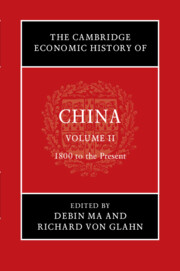Book contents
- The Cambridge Economic History of China
- The Cambridge Economic History of China
- The Cambridge Economic History of China
- Copyright page
- Contents
- Figures
- Maps
- Tables
- Contributors to Volume II
- Acknowledgments
- Note on Citations
- Introduction to Volume II
- Part I 1800–1950
- 1 Ideology and the Contours of Economic Change
- 2 Economic Transition in the Nineteenth Century
- 3 Agriculture
- 4 Handicraft and Modern Industries
- 5 The State and Enterprises in Late Qing China
- 6 State Enterprises during the First Half of the Twentieth Century
- 7 Money and the Macro-economy
- 8 Public Finance
- 9 Financial Institutions and Financial Markets
- 10 Chinese Business Organization
- 11 The Economic Impact of the West
- 12 Foreign Trade and Investment
- 13 Transport and Communication Infrastructure
- 14 Education and Human Capital
- Part II 1950 to the Present
- Index
- References
11 - The Economic Impact of the West
A Reappraisal
from Part I - 1800–1950
Published online by Cambridge University Press: 07 February 2022
- The Cambridge Economic History of China
- The Cambridge Economic History of China
- The Cambridge Economic History of China
- Copyright page
- Contents
- Figures
- Maps
- Tables
- Contributors to Volume II
- Acknowledgments
- Note on Citations
- Introduction to Volume II
- Part I 1800–1950
- 1 Ideology and the Contours of Economic Change
- 2 Economic Transition in the Nineteenth Century
- 3 Agriculture
- 4 Handicraft and Modern Industries
- 5 The State and Enterprises in Late Qing China
- 6 State Enterprises during the First Half of the Twentieth Century
- 7 Money and the Macro-economy
- 8 Public Finance
- 9 Financial Institutions and Financial Markets
- 10 Chinese Business Organization
- 11 The Economic Impact of the West
- 12 Foreign Trade and Investment
- 13 Transport and Communication Infrastructure
- 14 Education and Human Capital
- Part II 1950 to the Present
- Index
- References
Summary
For the Chinese, the nineteenth century was a period of waking up and realizing why the Middle Kingdom had fallen behind the West in economic growth. Not only had this large and once prosperous country fallen behind economically (with its apparent failure to industrialize), it also fell prey during the two Opium Wars to the same country that first embarked upon the Industrial Revolution – Britain. Consequently, a long period of autarky came to an end. While initially China was forced to open up only several “treaty ports” for trade and commerce, eventually the entire country was subjected to the influences of the West, and in spheres that went far beyond trade and commerce to also include industry, education, and even politics. By assembling data from a variety of previously untapped historical sources, this chapter attempts to analyze the Western influences that shaped the economic trajectories of late imperial China.
Keywords
- Type
- Chapter
- Information
- The Cambridge Economic History of China , pp. 354 - 413Publisher: Cambridge University PressPrint publication year: 2022
References
Further Reading
- 4
- Cited by

